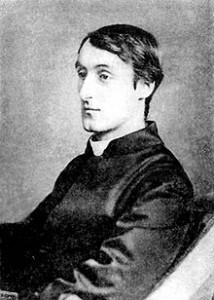 I don’t believe in God. I don’t believe in Tessa either. How can I believe in something that is right in front of me? True seeing is no longer believing, and believing is not truly seeing.
I don’t believe in God. I don’t believe in Tessa either. How can I believe in something that is right in front of me? True seeing is no longer believing, and believing is not truly seeing.
I have a relationship with God. I also have a relationship with Huckleberry Finn. Whether God and Huck exist is wholly immaterial to my relationships with them. Most of the world is unaware that Tessa exists, yet my relationship with her is just as vital and vibrant, regardless of anyone’s awareness.
If it is possible to set aside the ontological questions about God, one word remains to describe Hopkins’ poetry: powerful. He mixes God and people through the sensuousness of nature. Poetry without sensuousness is like swimming without water.
| God’s Grandeur 1:06 |
|
The world is charged with the grandeur of God. It will flame out, like shining from shook foil; It gathers to a greatness, like the ooze of oil Crushed. Why do men then now not reck his rod? Generations have trod, have trod, have trod; And all is seared with trade; bleared, smeared with toil; And wears man’s smudge and shares man’s smell: the soil Is bare now, nor can foot feel, being shod. And for all this, nature is never spent; |
| Pied Beauty :51 |
|
Glory be to God for dappled things— For skies of couple-colour as a brinded cow; For rose-moles all in stipple upon trout that swim; Fresh-firecoal chestnut-falls; finches’ wings; Landscape plotted and pieced—fold, fallow, and plough; And all trades, their gear and tackle and trim. All things counter, original, spare, strange; |

